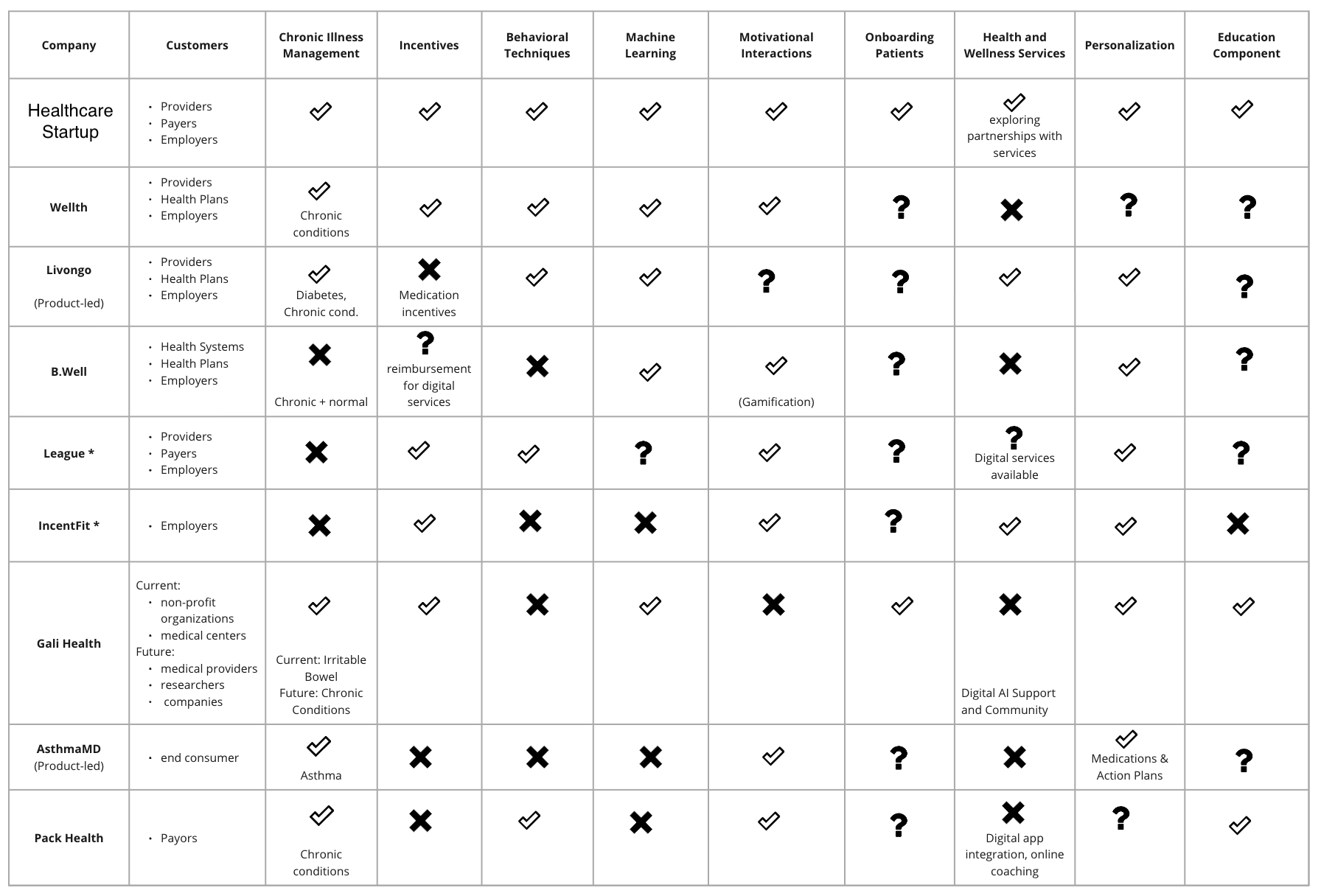Strategic roadmap of a purpose-driven healthcare startup
Developed a 1-3 year, strategy roadmap for a personalized healthcare, behavioral change, wellness startup.
The healthcare startup aims to reduce chronic illness costs and promote healthy behavior change.
This healthcare startup seeks to reduce healthcare costs associated with chronic conditions, such as asthma, heart disease, and diabetes, by guiding individuals toward behavioral and lifestyle changes that halt disease progression. Using a proprietary algorithmic tool, the startup analyzes users' motivation and designs personalized incentive strategies to cultivate healthy habits. These tailored programs, which span 1-3 months, emphasize habits such as quitting smoking and improving dietary choices. The ultimate objective is to demonstrate effectiveness to health insurers and employers, thereby reducing healthcare expenses.
As a burgeoning venture, the startup was seeking an initial beta partner to validate their efficacy and formulate a strategy for future partnerships to enhance user engagement. Consulting us for our strategic abilities, we developed a strategic roadmap to help them find partnerships that align with their values, mission and milestone goals.
CHALLENGE:Chronic illnesses imposed a dual burden on health and finances.
85% of healthcare costs in the U.S. were for the care of chronic conditions, including asthma, heart disease, and diabetes. While many companies offered products and services for healthier living, most people attempted these lifestyle changes independently. Due to barriers such as cost and location, many did not access these beneficial services, making lasting change more challenging.
OBJECTIVE:To help the startup looking to change that, I developed a strategy roadmap, which all started by defining the purpose.
In collaboration with a healthcare startup from Matter, Chicago's premier Healthcare Incubator, my team and I partnered with the startup's CEO to craft devise a strategic roadmap. This plan included determining the right market approach to set up a pilot program with carefully considered partnerships that would enforce health-focused behavior change.
PURPOSE ALIGNMENT:To understand what partners would be helpful, the purpose and mission needed to be crystal clear.
We began by defining a clear purpose statement to guide the strategic roadmap.
The purpose statement we crafted for the healthcare startup was:
STRATEGIC RESEARCH:Expert Interviews
To better understand the health insurance landscape, we engaged with professionals to gain their insight on opportunity areas and risks.
Drawing upon their deep insights and experience, these industry experts helped us to navigate the intricate ecosystem. Their guidance was instrumental in not only clarifying the complexities we faced but also in effectively communicating these complexities in a comprehensible manner to wider audiences.
Experts consulted to understand a complex ecosystem.
Their insight helped us to understand the landscape and where exactly the startup aimed to play. The map below illustrates this.
Competitive Analysis
To develop a plan with a competitive edge, we looked for opportunities through differentiation.
After thorough market analysis, we discerned the competitive scene and its offerings. This shaped our unique partnership choices for the healthcare startup. Despite a plethora of wellness apps for chronic illness users, only one provided personalized incentive programs. As a result, we centered on wellness partnerships that promoted equitable resource access for enduring behavior change, setting our approach apart.
STRATEGIC PLAN:Assumptions of the proposed strategy roadmap were evaluated to validate the potential efficacy.
Our strategy involved testing key assumptions:
Dietician Partnerships: We assumed tele-health consultations with dieticians would eventually decrease as users made better food choices, enhancing user satisfaction and healthier commitments. We validated this by introducing dietician consultations to 50 beta customers and comparing results against a control group.
Food Tracking Apps: We believed in the synergy between meal tracking and dietician guidance. We assessed this by reimbursing some Fillip members for using an external meal tracking app, monitoring their usage and feedback.
Meal Delivery Service: We postulated that easier access to healthy foods would boost engagement. To test this, we offered 50 beta customers an opt-in to the program, evaluating their feedback and food consumption against a control group.
Knowing the opportunities, risks, and assumptions, we extrapolated aligned target points to support the startup's mission at every step of the way.
We chose an ASO Insured Employer as our initial beta customer for the healthcare app, targeting their employees with specific chronic illnesses. Given the saturated market of behavioral apps in private insurance, ASO (admin services only) plans presented a promising B2B opportunity, as these employers might be more motivated to cut insurance costs. Our strategy included analyzing pilot program data to later engage other ASO Insured Employers and insurers with compelling evidence.
Aug. 2021 - Dec. 2021
Team members: Rodrigo Dyer, Allison Yang, Minyi Zhang and Beth Cerny
As part of a dynamic team, we partnered with a Healthcare Startup (name confidential due to NDA). While our approach was deeply collaborative, I took on the responsibility of project management. My role encompassed coordinating meetings and interviews, overseeing workflow processes, managing team dynamics, and developing research tools and communication materials.
I've always been drawn to projects that focus on personalized healthcare solutions. This particular initiative intrigued me with its aim to manage healthcare costs by targeting those with chronic illnesses. The app's unique motivation models showed promise, though I believed a comprehensive approach, considering all facets of health, would enhance its effectiveness. A holistic viewpoint recognizes both the external systemic challenges and the internal emotional needs of individuals. Our team discussions were productive, culminating in a strategy that embraces a broader perspective on healthcare. This revised approach promotes collaboration with health educators like dietitians and offers valuable services, such as food delivery and fitness plans. Initially envisioned for ASO Insured Employers, the pilot's framework has the potential to resonate across various healthcare sectors, emphasizing the importance of customized services and strategic behavioral changes.







